Intel Corporation (INTC): Intel: Supporting Hybrid Dual OS Tablets Is A ... - Seeking Alpha
This is not a new idea but Intel (INTC) is reportedly very bullish on dual-booting Windows/Android tablets and 2-in-1 notebooks. Microsoft (MSFT) and Google (GOOG) are not keen on the idea but Intel, according to The Verge's sources, is already sold on the concept. Intel will support and subsidize (via marketing) tablets and touch screen notebooks with dual-boot Windows 8 and Android OS capabilities.
The thumbs down from Microsoft and Google is quite understandable, those two are mortal combat enemies. The absence of Microsoft and Google from this mission is a big problem but Intel knows well that in order to achieve its target of 40 million tablet MPU shipment this year, it has to consider all available options. The x86 Bay Trail-T can run both Windows 8 and Android OS so it's pretty simple to put the two operating systems in one device. It has the money to help promote the concept.
INTC needs to be more assertive to attract more bulls than bears. GOOG and MSFT are outperforming Intel for the past year. I hope more investors reward Intel's breakaway move in supporting dual-OS devices. Brian Krzanich shows he is nobody's tool - he is boldly treading on toes of long-time allies so Intel can get ahead.
(click to enlarge)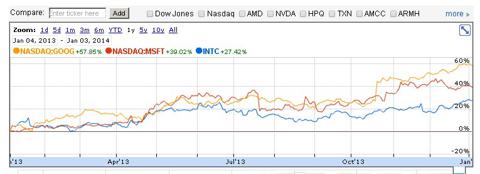
Consumers Benefit from Dual-Boot Hybrids
A dual-booting tablet with Windows 8.1 and Android OS 4 is a very attractive buy for budget-conscious consumers. Office workers and students who are dependent on Microsoft Office and other x86 productivity software can just carry one mobile device to work or school. If they want to play the latest Android-only games, they could easily reboot to Android. The consumers also benefits from this hybrid concept. Instead of buying two tablets, they can just buy one hybrid Windows 8/Android product.
I am highly confident that Intel and its OEM partners will sell more dual-boot tablets than pure Android or pure Windows 8.1 models. Intel only needs to properly market the said hybrid tablets. The OEM partners like Samsung, Acer, Asus, and others, should also keep the retail price tag below the $499 price level of the iPad.
Viewsonic, Samsung and Asus Have Done It
The hybrid, dual-boot tablet or notebook concept is not vaporware. Several companies already manufactured and sold such products before. Intel's support will definitely make the concept popular. Viewsonic came up with a hybrid Windows 7/Android 2.3 tablet in 2011. The Windows 7 OS is not optimized for touch operation and Viewsonic discontinued the dual-OS ViewPad. However, refurbished models of the hybrid tablet are still available for purchase at Viewsonic's site.
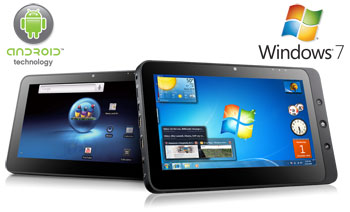
Samsung (OTC:SSNLF) also came up with a hybrid Windows 8/Android notebook last year. The Samsung ATiV-Q is tablet/notebook convertible similar to the Asus Transformer T100. However, the ATIV-Q can dual-boot Windows 8 and Android OS 4.2.2. A hands-on review of the ATIV Q can be read on this link. Due to issues about patents, Samsung has delayed the launch of the ATIV Q. Samsung and Intel are close collaborators and the American company may help free the ATIV Q from its patent problems.
(click to enlarge)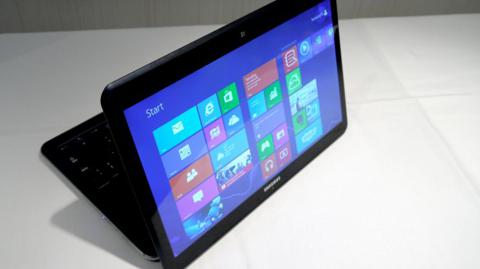
Since Samsung's hybrid product is still not available in the market, some enterprising programmers have created a method to dual boot Windows 8 and Android OS on the Acer Iconia W700. The tutorial is easy to follow but I would not recommend others to do it. I will not be responsible for any damage done by your clumsy attempts to be geeky.
It is better to just wait for Asus to unveil their new Transformer Trio at CES 2014. It will be an official Intel-equipped hybrid Android/Windows 8 tablet release. This first model should be the guinea pig for the concept and if it delivers the right price/performance quality, more OEM manufacturers will follow suit.
I do not like the fact that the Transformer Trio will not be able to dual boot on the touch screen slate form. The Windows 8 OS will need to be run from the attachable dock/keyboard part. It's a clumsy 2014 start but don't dismiss the hybrid concept yet. Asus engineers can quickly solve this problem if critics lambast them viciously enough.
(click to enlarge)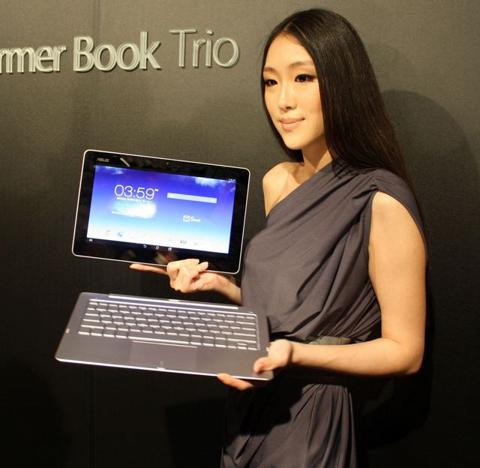
Dual-Boot on Tablet Form Is The Best Format
Intel should really follow the concept first established by Viewsonic, dual-booting from the same slate design. Windows 8 is optimized for touch operation and Intel ought to discourage the use of external keyboard or docking station for dual-booting purposes.
It should also encourage its partners to use cheaper Bay Trail-T or Cherry Trail-T chips instead of the Core i3 or Core i7 Haswell. Using cheaper processors means lower retail price tags. Sacrificing CPU power for energy-efficiency is a no-brainer.
Most consumers don't really give much priority to the computing capabilities of their tablets. They are happy to pay for anything that can smoothly run Skype, Viber, SnapChat, Microsoft Office 2013, Plants Vs. Zombies 2, and Candy Crush. Apple (AAPL) made a lot of money selling high-priced iPads to people who only use it to play games, browse the web, watch movies, listen to music, read e-books, and video chat.
The same idea should be applied by Intel and its partners. Make cheaper alternatives to iPad with the added bonus of Microsoft Office. Dislodging iPad from its leading market share position can be hastened by Intel-powered hybrid Windows 8/Android OS 4.2.2 tablets. Microsoft may object to this strategy but Intel needs only to convince the new incoming Microsoft CEO that hybrids actually helps Microsoft in the long run.
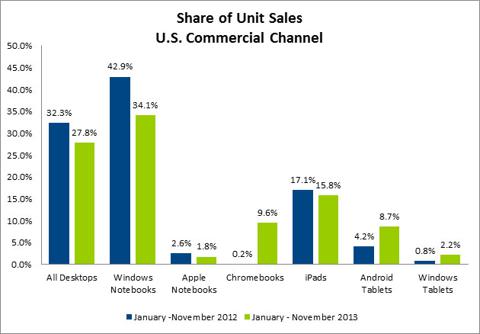
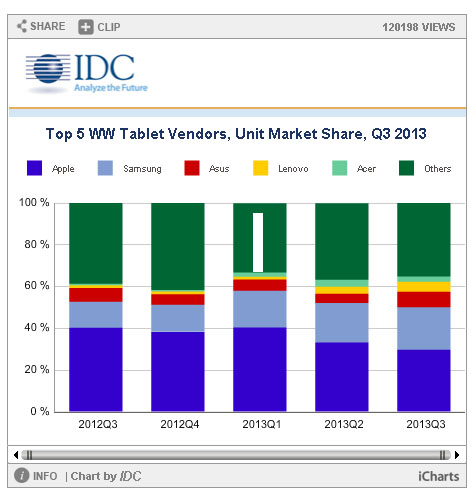
Conclusion:
Intel is very versatile and cunning. It is now showing some bravado - Intel is no longer the timid partner of Microsoft. Its new support for dual-OS tablets and notebooks is a brilliant tactic. It will definitely help Intel grab market share from Apple. A well-priced, high-performance, energy-efficient, Hybrid Android/Windows 8 might be a 2014 game changer for Intel's mobile ambitions.
Microsoft should also support this strategy. Intel is right in leveraging the fortified position of Google's Android OS. Hybrids will help Windows 8 ride the popular fad for Android-compatible devices. Here's Longboard's analysis of Microsoft, Windows 8/Android hybrid devices will help MSFT become the most valuable technology company in five years.
(click to enlarge)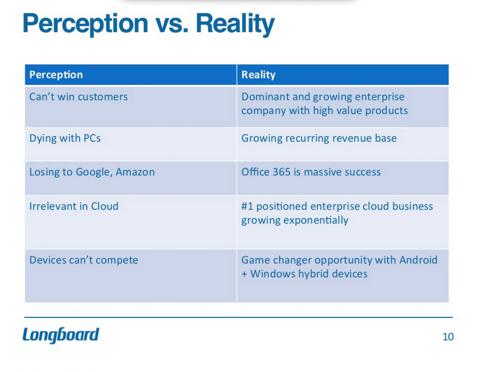
Intel also saves money from promoting fewer tablet products. Advertising takes a lot of money and it's best that Intel keeps its marketing subsidies for its partners as low as possible. INTC investors will not enjoy seeing their dividend money being spent on TV ads for Asus or Samsung hybrid tablets.
INTC is a strong BUY. The upcoming January 16th 4th Quarter and full-year financial report of Intel may provide investors a big surprise.I'm betting that a 30% upside for INTC this 2014 is highly probable.
Disclosure: I am long INTC. I wrote this article myself, and it expresses my own opinions. I am not receiving compensation for it (other than from Seeking Alpha). I have no business relationship with any company whose stock is mentioned in this article. (More...)
0 comments:
Post a Comment